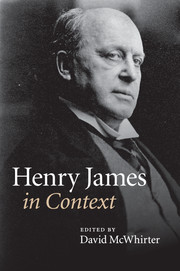Book contents
- Frontmatter
- Contents
- List of Illustrations
- Notes on Contributors
- Preface
- Abbreviations
- Chronology
- Part One Life and career, times and places
- Part Two Historical and cultural contexts
- Chapter 9 Aestheticism and Decadence
- Chapter 10 Authorship
- Chapter 11 Children
- Chapter 12 Consumer culture
- Chapter 13 Cosmopolitanism
- Chapter 14 Courtship, marriage, family
- Chapter 15 Ethics
- Chapter 16 Language
- Chapter 17 Law
- Chapter 18 Manners
- Chapter 19 Media and communication technologies
- Chapter 20 Modernism
- Chapter 21 Money and class
- Chapter 22 Museums and exhibitions
- Chapter 23 Nationalism and imperialism
- Chapter 24 Print culture
- Chapter 25 Psychology
- Chapter 26 Race
- Chapter 27 Realism and naturalism
- Chapter 28 Sexualities and sexology
- Chapter 29 Social sciences and the disciplines
- Chapter 30 Things
- Chapter 31 Time
- Chapter 32 Travel and tourism
- Chapter 33 Urbanity
- Chapter 34 Visual culture
- Chapter 35 Women and men
- Chapter 36 Work
- Part Three Reception
- Further reading
- Index
- References
Chapter 36 - Work
Published online by Cambridge University Press: 05 August 2014
- Frontmatter
- Contents
- List of Illustrations
- Notes on Contributors
- Preface
- Abbreviations
- Chronology
- Part One Life and career, times and places
- Part Two Historical and cultural contexts
- Chapter 9 Aestheticism and Decadence
- Chapter 10 Authorship
- Chapter 11 Children
- Chapter 12 Consumer culture
- Chapter 13 Cosmopolitanism
- Chapter 14 Courtship, marriage, family
- Chapter 15 Ethics
- Chapter 16 Language
- Chapter 17 Law
- Chapter 18 Manners
- Chapter 19 Media and communication technologies
- Chapter 20 Modernism
- Chapter 21 Money and class
- Chapter 22 Museums and exhibitions
- Chapter 23 Nationalism and imperialism
- Chapter 24 Print culture
- Chapter 25 Psychology
- Chapter 26 Race
- Chapter 27 Realism and naturalism
- Chapter 28 Sexualities and sexology
- Chapter 29 Social sciences and the disciplines
- Chapter 30 Things
- Chapter 31 Time
- Chapter 32 Travel and tourism
- Chapter 33 Urbanity
- Chapter 34 Visual culture
- Chapter 35 Women and men
- Chapter 36 Work
- Part Three Reception
- Further reading
- Index
- References
Summary
As a proud professional writer, Henry James disliked being told how to do his job. He particularly resented advice regarding what he should, or should not, write about. When, in 1884, Walter Besant published an essay of general guidance to prospective authors, James was quick to resist such axioms as that ‘a young lady brought up in a quiet country village should avoid descriptions of garrison life’ or that ‘a writer whose friends and personal experiences belong to the lower middle-class should carefully avoid introducing his characters into society’ (LC-1, 51). His celebrated response, ‘The Art of Fiction’, is notable, amongst other things, for its lack of professional dogma. While he is willing to agree, for instance, that the novelist ‘must write from his experience’, James insists that experience itself is such a slippery, indefinable quantity, ‘never limited’ and ‘never complete’ (52), that it would be difficult to know when one is not writing from it. The smallest hint of experience would enable ‘a damsel upon whom nothing is lost’ (52) to have plenty to say about soldiers’ lives. ‘The province of art is all life, all feeling, all observation, all vision’ (59), James famously concludes, refuting Besant’s ‘rather chilling’ (51) implication that writers should know, and stick to, their place. Yet, while he claimed ‘all life’ as matter for his art, this does not seem to have prevented James from feeling some hesitation about tackling subjects of which his own immediate experience was limited. One of these is the broad topic of this chapter: work.
- Type
- Chapter
- Information
- Henry James in Context , pp. 389 - 400Publisher: Cambridge University PressPrint publication year: 2010



